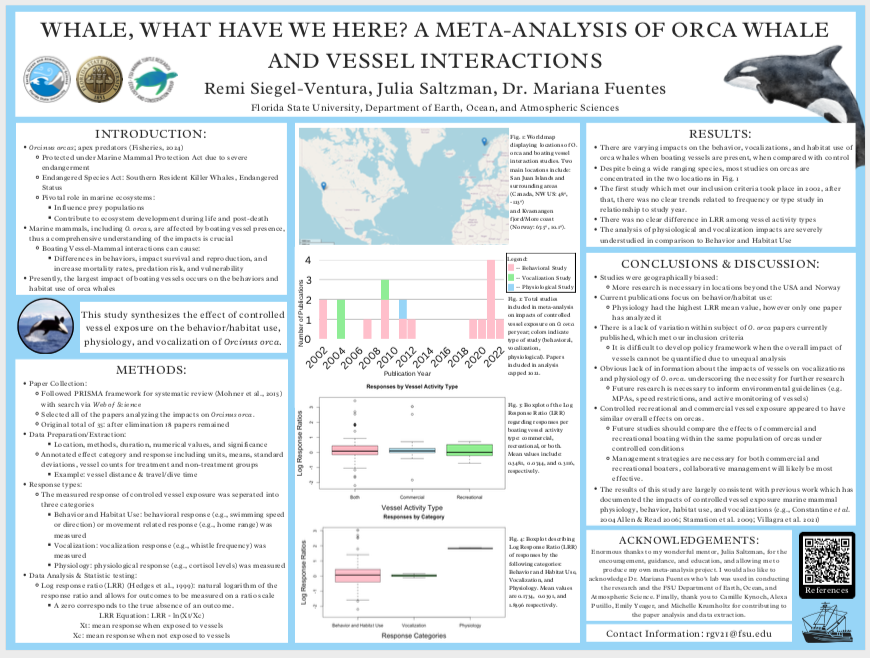Research Symposium
24th annual Undergraduate Research Symposium, April 3, 2024
Remi Siegel-Ventura Poster Session 4: 2:45 pm - 3:45 pm /10

BIO
Hailing from Fanwood, New Jersey, my fervor for marine mammal conservation, especially regarding orca whales and coral reef preservation, has steered my academic journey. Throughout my undergraduate tenure, I immersed myself in marine ecosystem research, presenting findings at the Florida Undergraduate Research Conference. Engaged in the Honors Program, I delved into laboratory research and actively participated in extracurriculars, such as the FSU Oxford Consortium of Human Rights, FSU Flying High Circus, and leadership roles in student organizations.
My career ambition centers on attaining a Ph.D. in Marine Conservation Biology to safeguard marine mammal populations and habitats, influencing governmental policies. Subsequently, I aim to pursue a law degree to actively shape policy formulation. By integrating scientific research, advocacy, and legal expertise, I am committed to preserving our oceans for future generations.
Whale, What Have We Here? A Comprehensive Analysis of Orca Whale and Vessel Interactions
Authors: Remi Siegel-Ventura, Julia SaltzmanStudent Major: Environmental Science, Classical Civilizations
Mentor: Julia Saltzman
Mentor's Department: Department of Earth, Ocean, and Atmospheric Sciences Mentor's College: College of Arts and Sciences Co-Presenters:
Abstract
The escalating prevalence of orca whale and vessel interactions has captured the attention of both the media and scientists. Recent analysis has indicated that these interactions are often playful behavior. However, the increasing frequency of orca-vessel interactions and damages demands an understanding of the impact vessels have on orcas. Orcinus orcas, apex predators, play a pivotal role in marine ecosystems by influencing prey populations and contributing to ecosystem development during life and post-death. This study attempts to synthesize the impact of vessel presence on orca whale behavior. To date, we have analyzed over 20 papers. Previous studies focus on behavioral changes including foraging, vocalizations, and dive patterns. Our preliminary findings indicate vessel presence, noise, and other factors impact behavior including but not limited to foraging, vocalizations, and dive times. The urgency of understanding this topic extends past scientific inquiry. Our findings underscore the necessity for further research to inform environmental guidelines, including the implementation of Marine Protected Areas (MPAs) or speed restrictions. Collaborative efforts with recreational and commercial vessel operators are essential to mitigate the escalating impact of these encounters. As vessel interactions with orcas continue to unfold, ongoing analysis and engagement with impacted industries are imperative for the formulation of effective guidelines and strategies. This research not only contributes to the broader understanding of marine ecosystems but also serves as a crucial step toward fostering sustainable coexistence between human activities and these magnificent creatures.
Keywords: whales, marine biology, science, meta-analysis


